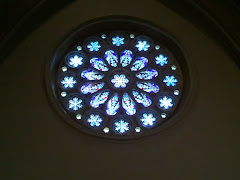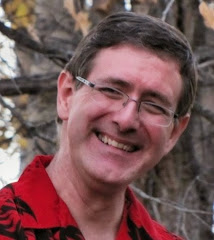Mom and I were not part of
that excitement. I can tell the
difference between a smooth milk chocolate of high quality, a chocolate with a
cheaper quality, and dark chocolate that should snap satisfyingly when it is
broken, and know the importance of a good sheen when chocolate has been
tempered well, but I don’t know how to do the same for whiskies, whether they
have an e in them or not. So we drifted
around the grounds, admiring the fresh fall air, the beautiful location and the
grand view of the region. It was pretty
splendid, with the fall colors!
Much to everyone’s surprise,
Mom came back with not a three leaf clover or even a four leaf clover, but a
five leaf clover she had found after casually looking at the ground and
wondering if she could find a four-leaf clover.
None of us could ever remember seeing a five-leaf clover, but there it
was, the genuine article, with all the leaves looking exactly the same
size. We took pictures of it because we
figured no one would believe us. And I
think Mom still has it pressed somewhere.
She didn’t go out and win the lottery though, so I’m not sure how lucky
it is. We’re still waiting.
Diversity in nature is an
amazing thing. There’s so much we still
do not know about nature. The odd discovery of a five-leaf clover when three is
the norm. And yet, it is still a clover
even though it is not a typical clover.
And that’s a good analogy for the Christian life. We are all human, and very diverse. Different Christians may believe different
things, but there is to be a core of similarity for us all. We are called to follow Jesus, which is not
easy. We all fall short of the mark, we
all haven’t quite become perfect yet, and we all make mistakes. It’s a comfort to read that even great people
like Paul had no illusions about humanity.
We like to keep secrets, we like to pretend we’re perfect, we like to
show a public persona to the world that looks polished and professional and
above reproach. Paul says that it’s not
about what we do in public or in private, but who we are becoming.
We are becoming, hopefully,
the image of Christ. Our baptisms, our
communions, our confirmations are all ways in which we remind ourselves and
each other that Christ works within us and through the Spirit to become ever
more Christ-like. Every renewed and
renewing, ever baptized and ever crucified.
Some days we know how sinful we are, how far from perfect we feel. Other days we feel buoyed by grace in
mysterious ways that we can’t quite explain. Or completely oblivious to how we
may be acting in ways that are less than holy.
One of the most inspiring
things we hear about Jesus time and time again, is how he met people and saw
them in all their messy mixed up ways.
The tax collector, the prostitute, the foreigner, the soldier, the
stinky fishermen, you know the list. And
again and again he met them where they were, without judgement, without
condemnation but with a deep compassion.
It was as if everyone Jesus met was completely transparent to him. In our scriptures today, he talked about that
transparency being inevitable. That
secrets we keep even from ourselves will come out in the end, and everything is
known to God. This idea of ultimate
transparency becomes a fuel for bravery.
If we are no longer afraid of our secrets being used to attack or blame
us, revile or shame us, then we can be bold disciples capable of daring acts of
justice.
We need daring acts of
justice. The last three years we have
seen the words of Jesus come true.
Families have become divided, parent from child, siblings from each
other, first by Covid, then by our beliefs around covid. People with attitudes of resentment towards
the loss of power and control they felt with the imposition of mask mandates
and vaccine passports became so enraged that their family members could not
even invite them over for Thanksgiving and Christmas. This is not new, of course. How many of us grew up with the instructions
not to talk about religion or politics at family dinners? And how many of us found ourselves in
conflict with family members on things like crop circles or whether or not the
world is flat? We are part of a
protestant denomination because our ancestors or even our own minds became so disenchanted with the status quo that we got caught up in a little thing called
the Reformation, led by Luther, John Knox and other theologians several hundred
years ago. 30 years ago we had a major
conflict over ordaining people who were not straight. And while the United Church first ordained in
1936, she actually applied to be ordained in 1925. It took 11 years of struggles and persistence,
division and argument. And now the
Baptist Convention in the states is going through the same divisive
conversation almost a hundred years later.
Daring acts of justice like painting rainbows on crosswalks, or bringing
friends to a blanket exercise or raising supplies for Ukraine, hosting
refugees, putting up campaign signs, speaking out against racist comments and
homophobic slurs. Standing up for people
who are being bullied by extremists, or even challenging comments at the
workplace with facts.
Being brave Christians is not
easy. It can hurt us when we stand up
for what is right. I’ve been watching
the conversation about the Westlock rainbow crosswalk very carefully. There’s a bunch of activists planning to keep
the crosswalk painting a safe and fun experience for the kids, and it’s been
interesting watching the conversation evolve.
The group started out in a very angry place, wanting to hurt and attack
the lobbyists trying to sabotage the crosswalk. They are shifting into a more non-violent stance, focusing on keeping the kids safe from homophobic attacks, making it a fun
event to the best of their ability, flooding the place with allies and caring
adults. The only time Jesus talks about
coming to bring swords instead of peace was in this passage in Matthew. The rest of the time he talked about turning
the other cheek, and taking up our crosses.
He was prepared to die rather than start a war. He told Peter not to use a sword when he was
being arrested in the Garden of Gethsemane. Non-violence is what he taught his disciples,
even if it cost them their lives.
We don’t have to be Oscar
Romeros or Martin Luther Kings. But we
are called to be open to the transformation that works in us and others by the
Spirit. Let us pray. Dear God, help us celebrate and love the
diversity of humans that is far more than four or five leaf clovers. Help us to become transformed into the image
of Jesus. Let us become Bold Disciples
willing to engage in Daring, Non-Violent Justice as courageously as Jesus did. Amen




